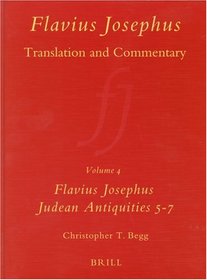Search -
Flavius Josephus: Translation and Commentary Judean Antiquities, Books 5-7
Flavius Josephus Translation and Commentary Judean Antiquities Books 57
Author:
Flavius Josephus, the first-century Jewish historian, is without a doubt the most important witness to ancient Judaism from the close of the biblical period to the aftermath of the destruction of the temple in 70 CE. His four surviving works - Judean War, Judean Antiqities, Life, and Against Apion - provide the narrative structure for interpreti... more »
Author:
Flavius Josephus, the first-century Jewish historian, is without a doubt the most important witness to ancient Judaism from the close of the biblical period to the aftermath of the destruction of the temple in 70 CE. His four surviving works - Judean War, Judean Antiqities, Life, and Against Apion - provide the narrative structure for interpreti... more »
ISBN-13: 9789004117853
ISBN-10: 9004117857
Pages: 373
Rating: ?
ISBN-10: 9004117857
Pages: 373
Rating: ?
0 stars, based on 0 rating
Publisher: Brill Academic Publishers
Book Type: Hardcover
Members Wishing: 1
Reviews: Amazon | Write a Review
Book Type: Hardcover
Members Wishing: 1
Reviews: Amazon | Write a Review
Genres:
- History >> Ancient Civilizations >> General
- Religion & Spirituality >> General
- Religion & Spirituality >> Judaism >> History
- Crafts, Hobbies & Home >> Home Improvement & Design >> Decorating & Design >> General
- Christian Books & Bibles >> Bible Study & Reference >> Commentaries >> General
- General




